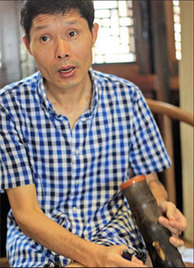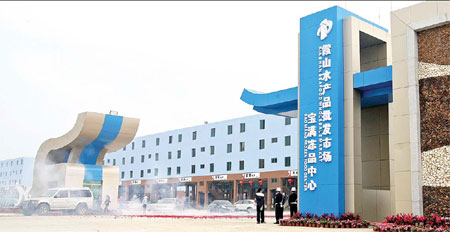Jumbo shrimp on the block

| Above: Bao Mang Frozen Food Center is a modern cold warehouse. Left: Long Tujin says his Xiashan Seafood Market is a trading and logistics center. Photos Provided to China Daily |

Man behind largest prawn trading market in Asia shows how he did it
Long Tujin is in an industry that many might not take seriously.
For one thing, its main product is the humble prawn.
At the same time, no government agency been able to properly regulate the market, making it notoriously complicated.
But the global operation that Long has created and now controls shows just what a massive earner prawns can be, and how efficiently the industry can be run.
Long's Xiashan Seafood Wholesale Market is the largest prawn trading market in Asia and provides 40 percent of the whiteleg shrimps sold in the United States.
It currently accounts for two-thirds of China's and one-third of the world's prawn produce.
Similar to how market conditions in the Netherlands determine the price of tulips and in Japan the price of tuna, Long's Xiashan Seafood Market is the most accurate weather vane for the global price of prawns, experts suggest.
So how can this one man, whose surname means "dragon" in Chinese, manage to make himself the dragon of the prawn market?
His answer is simple. He says that since he set up his company, Zhanjiang Zhongxin Co Ltd, the one main thing he has done is "remove the obstacles to a free market".
It was in the early 1990s that Long - working as a mid-level manager at a local construction company after failing to make any real money as a crab dealer - turned his attention to the prawn market, then a growing, but poorly regulated, business.
At the time, Long remembers, it was a market being run without "rule of law, nor rule of man".
Prawn dealers would spare no effort to con farmers, forcing them to lower their prices to unbearable levels by telling them that there was an oversupply in the market, and their prawns were not selling.
The dealers, in turn, would tell the buyers - many of whom had surprisingly little knowledge of the market - that prawns were in short supply, marking them up to unreasonable highs.
Dealers at that time made money "just by taking advantage of information asymmetry, and that was their business model", says Long, the 49-year-old farmer-turned-entrepreneur whose family was too poor to send him to college after he finished high school.
It was a corrupt market and far from free, he says. "When the interests of both sellers and buyers are hurt, by either inflated or deflated prices, trade volume is the victim.
"Everyone will go looking for reasonable prices elsewhere, or just quit the business."
Someone had to stand up and redress the situation, and Long took it on, launching his own market.
For the first few years, all he did, except for building the market itself, was developing relationships.
He made friends with as many dealers and buyers as possible: talking with them, offering them free advice, and linking trustworthy dealers with out-of-town buyers. Friendships and reputation brought in business.
As he became someone known and liked, he built a prawn-trading exchange where dealers, farmers and buyers met face-to-face.
Dealers received a commission of 0.4 yuan (6 cents, 0.05 euros) per kilogram, while Long collected his dues from rentals.
But most importantly, all who came to his market had to go by his "Long rules": no fraud, no fakes, strictly open and honest business.
His market was a game-changer.
It provided incentives for the dealers to process as much volume as possible and no longer depended on unreasonably high markups.
And since all the transactions were openly negotiated in his marketplace, involving huge volumes on a daily basis, people did not have to work excessively hard for a reasonable profit.
His being "reasonable" has had a formidable effect.
The Xiashan market's annual trading volume has grown from 3.5 billion yuan in 2002 to about 10 billion yuan last year. Its turnover would hit 30 billion yuan, if other aquaculture products were counted.
Long's employees, he says, work hard to remain "reasonable".
They send mobile text messages, for instance, to prawn farmers who have registered for his service, feeding them information about the industry and his market, and most importantly, supply and demand around the world for shrimps.
"You are wrong if you think this marketplace is only a trading center," Long says. "It is also a logistics and information center and connects numerous stakeholders in numerous ways."
Pointing to his newly built, ultra-modern cold warehouse, which can hold 100,000 metric tons of shrimps, Long says proudly: "This is now what we can do to help prawn farmers dodge seasonal price changes."
Prawn harvests, which mainly occur between September and October, are kept at -23 C in the warehouse, waiting to be arranged in steady shipments to Western markets.
The cold storage serves as a reserve - hoarding prawns when supply is abundant, and releasing them when supply is low. The aim is to prevent the industry from being affected by price shocks.
Based on its huge and growing daily volumes, and soaring credit standing, Long's market is now offering financial plans to help its registered buyers.
Traditionally, prawns have been a strictly-cash business, demanding huge cash payments from purchasers.
If they could not make the payments, they sometimes resorted to private lenders, usually at much higher interest rates to regular bank loans.
Seeing the problem, Long successfully persuaded commercial banks to extend their services to the market, equipping it with a modern payment system.
With the agreement of the market, three to five registered buyers can provide a group guarantee for one small buyer's credit standing.
Of the 320 loans that have been extended so far, not one single default has been reported.
By May 2012, Industrial and Commercial Bank of China, the country's largest bank by market value, had issued 1.13 billion yuan in loans to Long's members.
Long is not the least bit worried about his methods being imitated by others.
Smoking tobacco at his newly completed holiday home on the coast, the short, dark, slim man speaks in a heavy local accent.
"They may try to copy my methods in other industries. But in the prawn industry, once a trading center like this is established, it would take a hell of a lot of effort to replicate it."
zhengyangpeng@chinadaily.com.cn
(China Daily 09/28/2012 page21)
Today's Top News
- Experts share ideas on advancing human rights
- Japan PM's remarks on Taiwan send severely wrong signal
- Key steps to boost RMB's intl standing highlighted
- Sustained fight against corruption urged
- Xi calls for promotion of spirit of volunteerism
- Xi calls for promoting volunteer spirit to serve national rejuvenation































